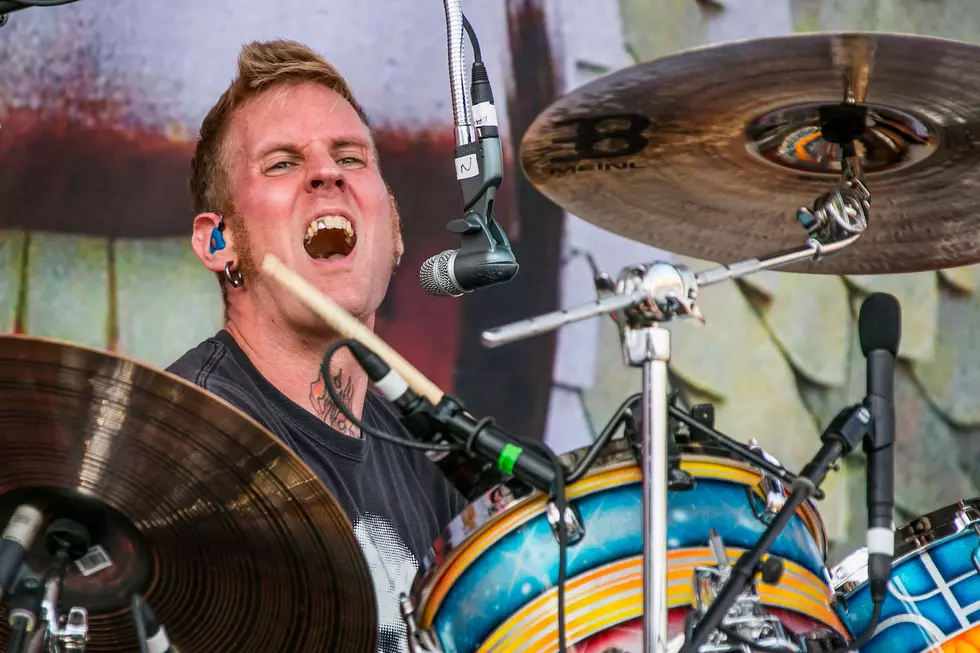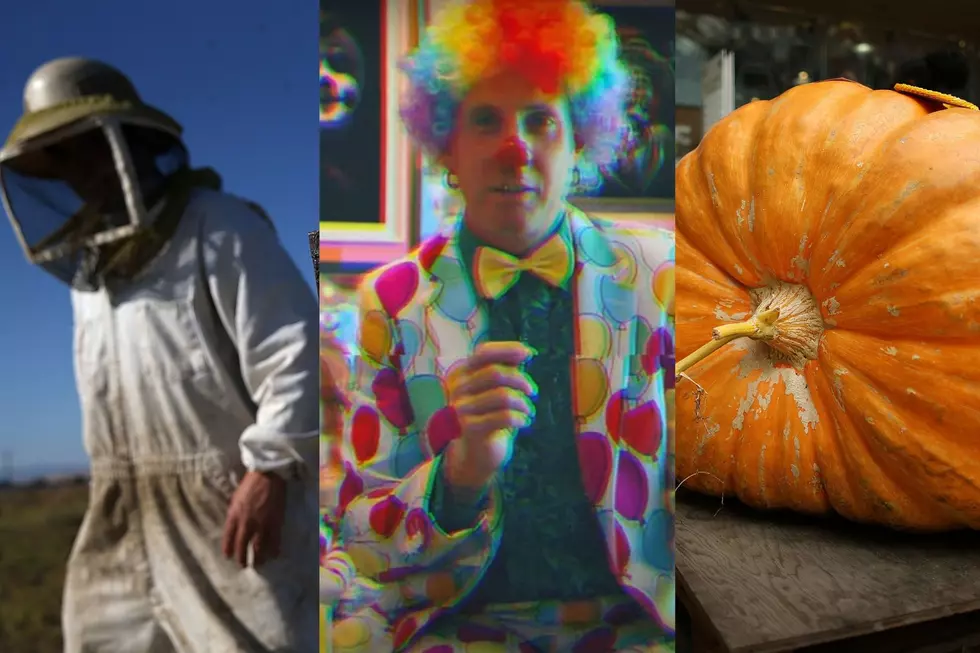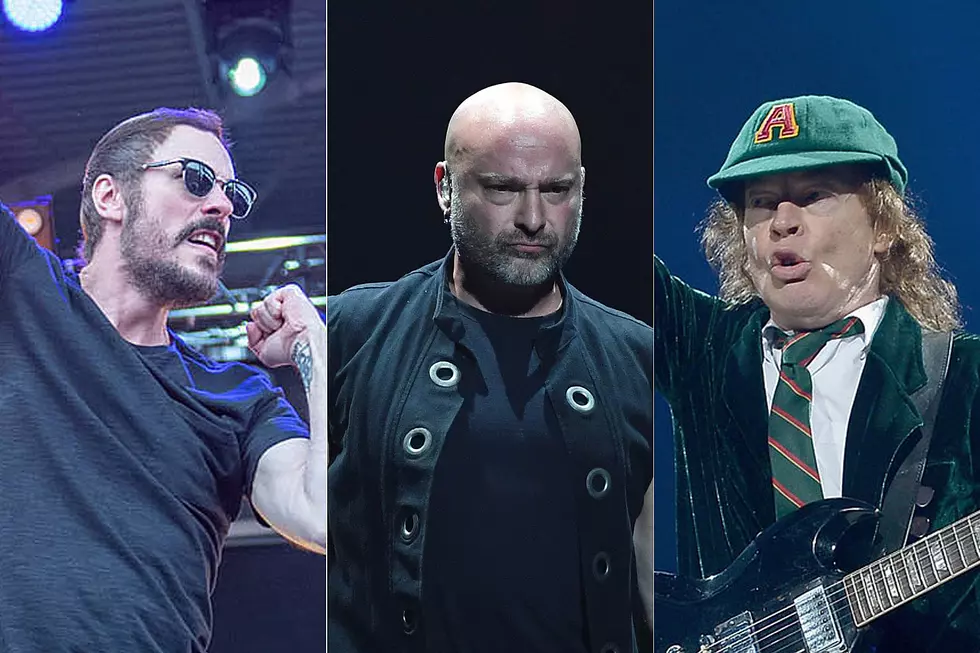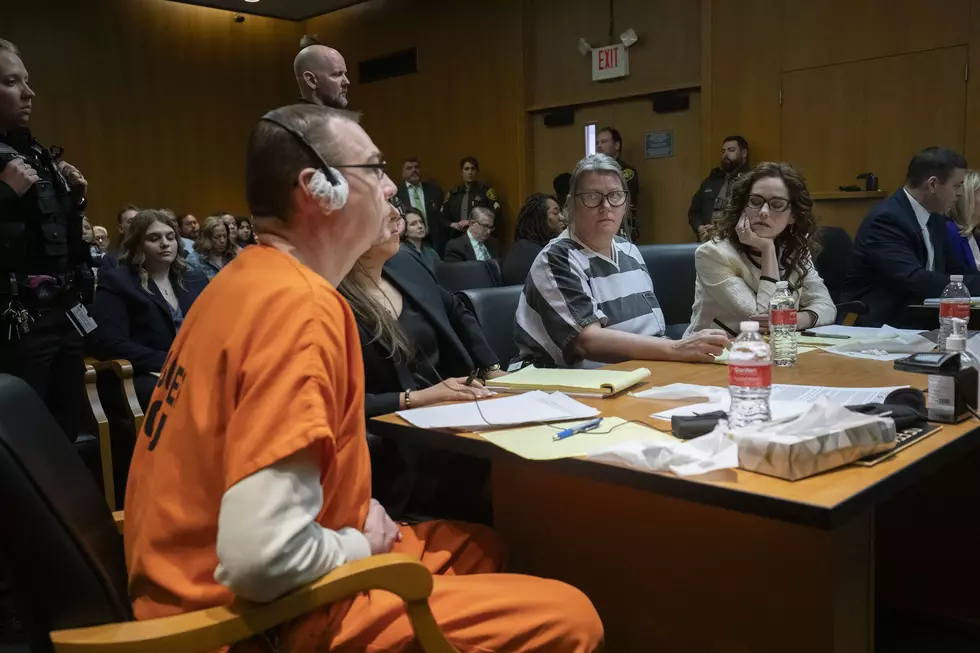
Mastodon’s Brann Dailor: Writing ‘Crack the Skye’ Was ‘A Bit Like Torture’
Mastodon drummer Brann Dailor was the latest guest on Full Metal Jackie's weekend radio program. He discussed the band's tour celebrating the tenth anniversary of their groundbreaking Crack the Skye album and what helped make that album such a different one for Mastodon at that point in their career. The skinsman also touched on their recent "Stairway to Heaven" cover, which was done in honor of their late manager Nick John.
You guys are going to be spending most of the summer on tour celebrating Crack The Skye. What catches you by surprise when you prepare to perform an album in its entirety 10 years later?
It's nice to revisit because I'm going back and listening to the actual album. Usually when we're done recording [an album] and then we start playing it live, I don't really listen to it again. So, I guess it's the surprising thing of just going back and listening to all the crazy layers that we put into that record and just hanging with it and figuring out how can we represent this album better than we did the last time that we had it out.
Crack The Skye was such a monumental album for Mastodon, professionally and personally. What was different about the process of making that album compared to everything that preceded it and the albums that you've made since?
In the beginning, there was a lot of nervousness and we really weren't sure about what was going on with our band really, to be honest. Not like we were on the verge of ever breaking up or anything like that, but I just was worried about Brent [Hinds]. He'd had a brain injury that he sustained during an evening in Las Vegas and was in the hospital.
He had this pretty bad concussion and he had vertigo and he was basically just kinda chilling at home writing music on acoustic guitar. There's a lot of days that he just couldn't show up for practice and we just didn't know what was really happening.
It was business as usual. We were going down there — Bill [Kelliher], myself, and Troy [Sanders], and the door always open whenever [Hinds was] ready to come on down and join us. But it kinda went on for a while. We were writing stuff, but he wasn't there to have any input. So, we didn't feel 100 percent comfortable because we don't really do that. We like to work together and have everybody's input as we move along.
So, eventually he started coming down, and he had all this material written cause he'd been sitting at home kinda nursing his wounds. It was really beautiful, it just didn't sound like — it sounded like us, but it sounded more mellow but more foggy and just different.
There was probably a turning point where we all said, "Okay, we need to just stop with all the fast, crazy, heavy stuff and maybe just focus on the stuff that Brent is writing and point our divining rod in that direction. Let's get in the mood of whatever this is because it's definitely like a vibe change from what we're used to." But it's a good thing then we just all started following Brent's lead with the music and what it was gonna sound like and where it was going.
We just were able to go someplace emotionally that I don't think that we had been before. That's when lyrically I made the decision to put some of the more traumatic experiences in my life into that as well because I felt like musically it was going there, so might as well give everything I have too if Brent was going to be doing that.
I think that's what sort of set it apart. It wasn't just riffs and heavy — it wasn't as fun, to be honest. It was a little bit like torture. But the end result I think was really magnificent.
I just remember having that moment when we all sat back and listened to the finished product in the studio and just really kinda being blown away and not really recognizing ourselves, just being like, "Is that us for real?"
That was a beautiful moment that we all cherish. That's why I think that it's important that we all celebrate that 10-year anniversary with playing it live again, just because we feel like it's one of our most comprehensive works from start to finish. It's like the planets aligned on that one.
Crack The Skye changed Mastodon musically and in terms of what people could expect from the band. In what ways do you think revisiting it now might facilitate another overall change?
I'm not sure if it will facilitate an overall change. When you remind yourself of your former self, maybe parts of you that you forgot along the way get repurposed and reimagined, and you're able to fold those things back into your overall personality, musically.
Maybe this is a good thing that we're visiting this, especially with our recent unfortunate tragedy that we just went through as a band. It's probably one of the hardest things that we've gone through as a band altogether with the death of our manager, Nick John.
It's perfect that we're digging deep into Crack the Skye because I think it's good to remind each other where we can go as a band and that maybe Nick John deserves the same amount of attention paid to music on the next album. It could work in that favor — I'm not sure.
A newly recorded Mastodon version of "Stairway to Heaven" was a Record Store Day exclusive in honor of your manager, Nick John, who you just touched upon. How did recording that song makes you feel more connected to Nick?
Everybody that knew him knew the guy loved Led Zeppelin more than anybody I have ever met. So, when we were approached by his wife to do "Stairway" at the funeral, the first instincts were that that would not be good just because who knows what headspace we're gonna be in. It just seemed like pressure and it seemed like something that I'd rather run in the other direction from. Plus, "Stairway to Heaven" is just like the most iconic rock song of all time.
There's probably a general consensus amongst the the rock community of hands-off "Stairway to Heaven." It's not like we came up with, "Hey, I got a great idea for 'Stairway to Heaven' — a way we could improve upon it." That's crazy.
But just thinking about it in my head it was like, "No, I don't want to do that because that sounds really scary and I'm gonna be crying and so I don't want to sing it because singing and crying don't mix. But then, you know, half a second later it was like, "Yes, of course, we have to do that."
So, me and the guys, we got together in the practice space and just started going through it. Everybody thinks they know a song until they start breaking it down and trying to learn it to really actually cover it. So, it was cool to kinda get inside Led Zeppelin's head a little bit. That's sort of what you do when you do a cover song and it was interesting. I thought it was fun.
It was fun to sit and learn the song with the guys knowing that we were gonna do this cool thing for our buddy and give him a nice send-off. Even though we're all sort of still in shock — and we still are. It's like the last thing that we want to admit to ourselves is the fact that he is not with us anymore. It's like, "No, I don't want that to be a real thing."
I hate that. I just want to call my friend on the phone or just see him and give him a hug. But it was the best thing. We didn't have any plans for recording it. We were just going to do it for the funeral and that was it. So, we got up at the funeral and we did our rendition of it and I think it was just really a good choice. Everybody knows "Stairway to Heaven." We did a pretty faithful rendition of it. Everybody could sing along, and Nick was right there next to us when we did it.
It was one of the heaviest moments that I ever experienced and I think that everybody in the band has ever experienced. It's just the kind of thing you could never foresee yourself having to do or doing. But there we were doing it and I thought that we did a pretty good job with the circumstances. We did our boy right, you know?
Afterward, Joe [Duplantier] from Gojira, said, "Hey man, I recorded that on my phone. I said, "Oh that's cool" and he said, "Man, you should release that." It was really beautiful with the acoustics of the church and everything — it really sounded awesome. We said, "Oh, I don't know."
Then he went back to his studio and just kinda like messed with the levels a little bit and sent it over. We checked it out and said, "Man, that does sound pretty good. It would be cool if we went in and did a studio version of it and we could put out a Record Store Day exclusive because he loved Record Store Day and then have his face on a 10-inch album and then be in one of his favorite places to be in the whole world, which was in an independent record store, on Record Store Day." So, his face will be plastered all over every single record store in America for that one special day and all the proceeds go to benefit pancreatic cancer research. It just seemed like the perfect thing to do and a great way to honor our friend.
When you're in management, you're behind the scenes. Nobody knows your name, but he had so much to do with where we are today as a band, where we are today as human beings. He just was our biggest fan, our biggest cheerleader, one of our best and closest and dearest friends.
We're gonna miss him. It reveals itself to us how much we miss him on a daily basis. So, as soon as someone like that passes, you try to figure out, "How do I let the world know that this person existed and how important they were?" And this is the best way that we could do that.
The band updated its rehearsal facility to be a full-fledged recording studio. What impact do you anticipate the convenience of that accessibility will have on the creative aspect of making music?
It's gonna have a positive impact. I think that we can get in there whenever we have any kind of idea or song idea, we can lay it down right then and there.
A lot of bands have that capability, but I'm just hoping for us that it creates a more fruitful recording experience for us and that we're just way more prolific and can just release or come out with new material all the time or at least have new material recorded and kinda ready to go.
I think that sometimes your best results come from that initial spark. So, the ability to go in there and be able to record those moments is pretty great. So, yeah, I'm looking forward to seeing what that yields.
Brann you ventured into different territories by recording a solo track for a soundtrack to a DC Comics graphic novel. What makes writing a song about Batman different from anything else?
I don't think it's really that different. It's just putting yourself in the mind of a character. You're given like the storyline and there's not much separation from what I do normally. I'm not really that talented of a lyricist or anything, but when I sit down to write, I always have something cinematic playing in my head. I always have some kind of movie, that's why it's so much easier for me to write lyrics when I have a storyline, an outline in front of me, something I can see. Even just riffs — when I'm listening to a riff, it's conjuring an image or it's conjuring some kind of storyline. I see something happening within the riff.
Then whatever I'm seeing usually lends itself to the lyrics. So that's how the lyrics are manifested from the vision that's extracted from the riff. But with this, there was already a brief outline and summary and I definitely needed it to match up with the music.
So when I heard some of the music, heard a bunch of different songs and gravitated towards that one and had gotten a melody in my head for one of the parts. I just concentrated on it and tried to dig in on it emotionally and tried to dig in on it conceptually with where I always wanted it to come from lyrically based on the brief storyline I was provided.
Thanks to Brann Dailor for the interview. Follow Mastodon on Facebook to stay up to date with their touring activities and everything else they're doing. Find out where you can hear Full Metal Jackie’s weekend show here.
Where Does Brann Dailor Rank Among the Top 66 Hard Rock + Metal Drummers of All Time?
More From Banana 101.5










